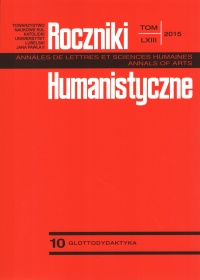Developping Media Comptence in Lifelong Learning Approach
Abstract
The present paper rests on the assumption that elaborating the determinants of media competence facilitate the conceptualization of the individual communicative competence development in accordance with formal requirements for teaching/learning at advanced L2 levels.
The paper presents the chosen conclusions of my action-research project, whose major aim was to elaborate the determinants of constructive learning actions involving the selection and proper interpretation of media resources in French. These skills, inherent to media competence and necessary for the learner autonomy development, were trained in discussion tasks aimed at improving communicative skills and accomplishing cognitive goals connected with knowledge construction.
References
Autonomizacja w dydaktyce języków obcych. Doskonalenie się w komunikacji ustnej, red. W. Wilczyńska, Poznań: Wydawnictwo Naukowe UAM 2002.
Buckingham D.: Media education; literacy, learning and contemporary culture, Cambridge: CUP 2003.
Coste D., North B., Sheil J., Trim J.: Europejski system opisu kształcenia językowego: uczenie się, nauczanie, ocenianie, Warszawa: CODN 2003.
Defert-Wolf L.: Information literacy – koncepcje i nauczanie umiejętności informacyjnych. „Biuletyn EBIB” [czasopismo elektroniczne] 2005, nr 1(6) Warszawa : Stowarzyszenie Bibliotekarzy Polskich. KWE. http://ebib.oss.wroc.pl/2005/62/derfert.php [dostęp: 28.12.2014]
Górecka J., Wilczyńska W., Wojciechowska B.: Discursive Approach: The conceptual Framework of the Project and Results of a Pilot Study, w: Issues in Teaching, Learning and Testing Speaking in a Second Language, red. M. Pawlak, E. Waniek-Klimczak, [Second Language Learning and Teaching, XIV], Berlin–Heidelberg: Springer Verlag 2015, s. 29-43,.
Gunawardena C. N., Lowe C.A., Anderson T.: Analysis of a global online debate and the development of an interaction analysis model for examining social construction of knowledge in computer conferencing. “Journal of Educational Computer Research” 1997, No 17 (4), s. 297-431.
Hanna B.E., de Nooy J.: Learning language and culture via public Internet discussion forums, Basingstoke–New York: Palgrave Macmillian 2009.
Karpińska-Musiał B., Orchowska I.: Świadomość przedmiotowa i epistemologiczna nauczyciela-refleksyjnego praktyka z perspektywy polskiej glottodydaktyki, „Neofilolog” 2014, nr 43 (1), s. 25-38.
Kluster Y., Lameul G.: Un cadre d’analyse multidimentionnel de débats en ligne asynchrones, w: Interagir pour apprendre en ligne, red. E. Nissen, F. Poyet, T. Soubrié, Grenoble: PUG 2011, s. 25-43.
Meyer K.A.: Evaluating online discussions: four different frames of analysis “Journal of Asynchronous Learning Networks” 2004, No 8(2), s. 101-114.
Newman D.R., Webb B., Cochrane C.: A content analysis to measure critical thinking in face-to-face and computer supported group learning, “Interpersonal Computing and Technology” 1995, No 3 (2), s. 56-77.
Orchowska I.: La formation interculturelle des futurs enseignants de FLE dans le contexte universitaire polonais, Kraków: Flair 2008.
Wilczyńska W.: Uczyć się czy być nauczanym. O autonomii w przyswajaniu języka obcego, Warszawa: PWN 1999.
Copyright (c) 2015 Roczniki Humanistyczne

This work is licensed under a Creative Commons Attribution-NonCommercial-NoDerivatives 4.0 International License.





